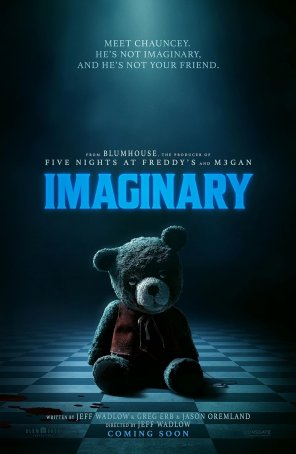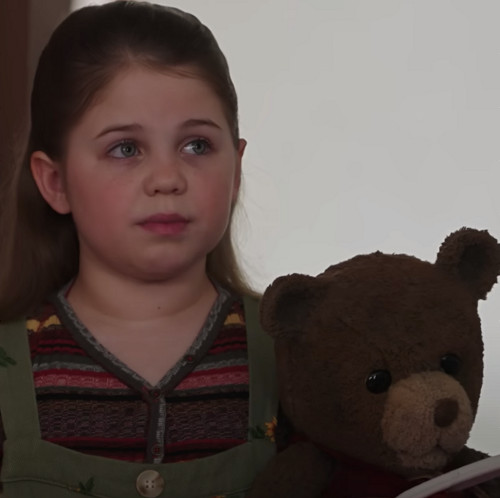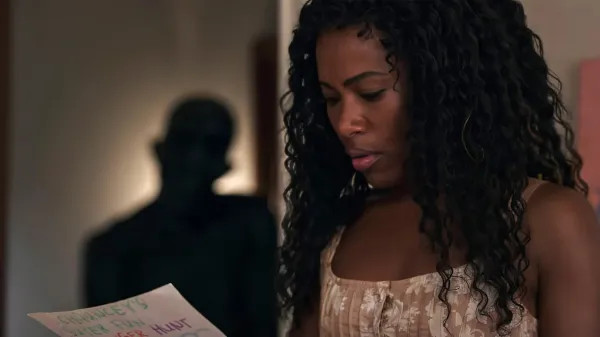Imaginary (United States, 2024)
March 08, 2024
Imaginary is Blumhouse through-and-through. Once in a while, Jason Blum’s template results in an honest-to-god inventive horror experience but, more often than not, his cheaply-made, throw-way films belong buried six feet under with the various killers, creeps, ghosts, and demons that populate them. Imaginary has all the requisite hallmarks: a cast of unknowns, a screenplay that feels half-finished, a familiar director, a small budget, and a teen-friendly PG-13 rating. To be fair, Imaginary tries to be a little different, playing with warped perceptions of reality, but the need to include too many horror tropes results in a confused (and at times confusing) storyline. (The trailer also sells a different movie but that’s the fault of the marketing department, not the filmmakers.)
The movie opens by introducing the main character, Jessica (DeWanda Wise), who has decided to move back to her childhood house with her new family: husband Max (Tom Payne), teenage step-daughter Taylor (Taegen Burns), and 8-year old stepdaughter Alice (Pyper Braun). While rooting through boxes in disused parts of the house, Alice discovers Jessica’s teddy-bear, Chauncey. An immediate bond forms between Alice and her imaginary friend. Initially, Jessica sees this as a positive development and focuses her attention on becoming more of a mother-figure to Taylor, who is in a rebellious phase. But Chauncey is no benign inanimate object and Alice’s fixation on accompanying the supernatural entity to some “never ever” place, alarms Jessica – especially since it echoes aspects of her own dimly-remembered childhood.
 The gap between what Imaginary wants to be and what
it achieves is vast. Director Jeff Wadlow may have had grand ideas for the
production, but what reaches the screen is a collage of partially realized
ideas – some good, some bad – that are undermined by plastic acting, wooden
dialogue, and an embarrassment of an ending. Allusions to A Nightmare on Elm Street (and other, better movies that play with the boundaries between
imagination/fantasy and reality) are intentional but feel almost insulting by
their inclusion.
The gap between what Imaginary wants to be and what
it achieves is vast. Director Jeff Wadlow may have had grand ideas for the
production, but what reaches the screen is a collage of partially realized
ideas – some good, some bad – that are undermined by plastic acting, wooden
dialogue, and an embarrassment of an ending. Allusions to A Nightmare on Elm Street (and other, better movies that play with the boundaries between
imagination/fantasy and reality) are intentional but feel almost insulting by
their inclusion.
The child-in-danger trope is commonplace in modern horror but it needs to be approached with care. In this case, it’s more disturbing than effective in large part because the screenplay only plays at having empathy with Alice. A scene in which she nearly impales her hand on a rusty nail may cause some viewers distress – just ask a parent of any young child not to be repulsed. In terms of the more conventional horror aspects, even though the monster is given the Jaws treatment (kept mostly in the shadows and rarely fully shown), its cheesiness is inescapable, hearkening back to the man-in-a-rubber-suit era.
 The cast is populated by actors I’m mostly unfamiliar with. DeWanda
Wise comes with a lengthy resume, although much of her work has been on the
TV/streaming side of things (she had the lead in the reboot of Spike Lee’s She’s
Gotta Have It). This performance isn’t going to provide highlight reel
exposure for her. Taegen Burns and Pyper
Braun fall into the “up and coming” category although whether either has what
it takes to move to bigger and better roles remains to be seen. Then there’s
Betty Buckley. The veteran Broadway star and Tony Award winner had to wait
until she was 76 years old to find the low-water mark for her career (but at
least now she can finally say she was in something worse than “Eight Is Enough.”)
The cast is populated by actors I’m mostly unfamiliar with. DeWanda
Wise comes with a lengthy resume, although much of her work has been on the
TV/streaming side of things (she had the lead in the reboot of Spike Lee’s She’s
Gotta Have It). This performance isn’t going to provide highlight reel
exposure for her. Taegen Burns and Pyper
Braun fall into the “up and coming” category although whether either has what
it takes to move to bigger and better roles remains to be seen. Then there’s
Betty Buckley. The veteran Broadway star and Tony Award winner had to wait
until she was 76 years old to find the low-water mark for her career (but at
least now she can finally say she was in something worse than “Eight Is Enough.”)
This is Wadlow’s third outing for Blumhouse. Although a terrible film, it’s the best of the three – the others were one-star stinkers: Truth or Dare and Fantasy Island. Wadlow’s love of PG-13 horror is part of the problem – all his movies represented R-rated material ruthlessly neutered to make them available to younger viewers. For Blum, this is just another in a seemingly-endless stream of titles. It doesn’t need to do more than break even (a low bar considering the minimal production costs) and, given the current horror zeitgeist, it will likely achieve that level of success. Business considerations aside, however, there’s nothing imaginary about how bad a misfire this movie is even for the Blumhouse base.
Imaginary (United States, 2024)
Cast: DeWanda Wise, Taegen Burns, Pyper Braun, Tom Payne, Betty Buckley
Screenplay: Greg Erb, Jason Oremland, Jeff Wadlow
Cinematography: James McMillan
Music: Omer Ben-Zvi, Alexandre Cote, Kevin Lax, Bear McCreary
U.S. Distributor: Lionsgate
U.S. Release Date: 2024-03-08
MPAA Rating: "PG-13" (Violence, Disturbing Images, Profanity)
Genre: Horror
Subtitles: none
Theatrical Aspect Ratio: 2.35:1
- (There are no more better movies of DeWanda Wise)
- Jurassic World: Dominion (2022)
- (There are no more worst movies of DeWanda Wise)
- (There are no more better movies of Taegen Burns)
- (There are no more worst movies of Taegen Burns)
- (There are no more better movies of Pyper Braun)
- (There are no more worst movies of Pyper Braun)
Comments